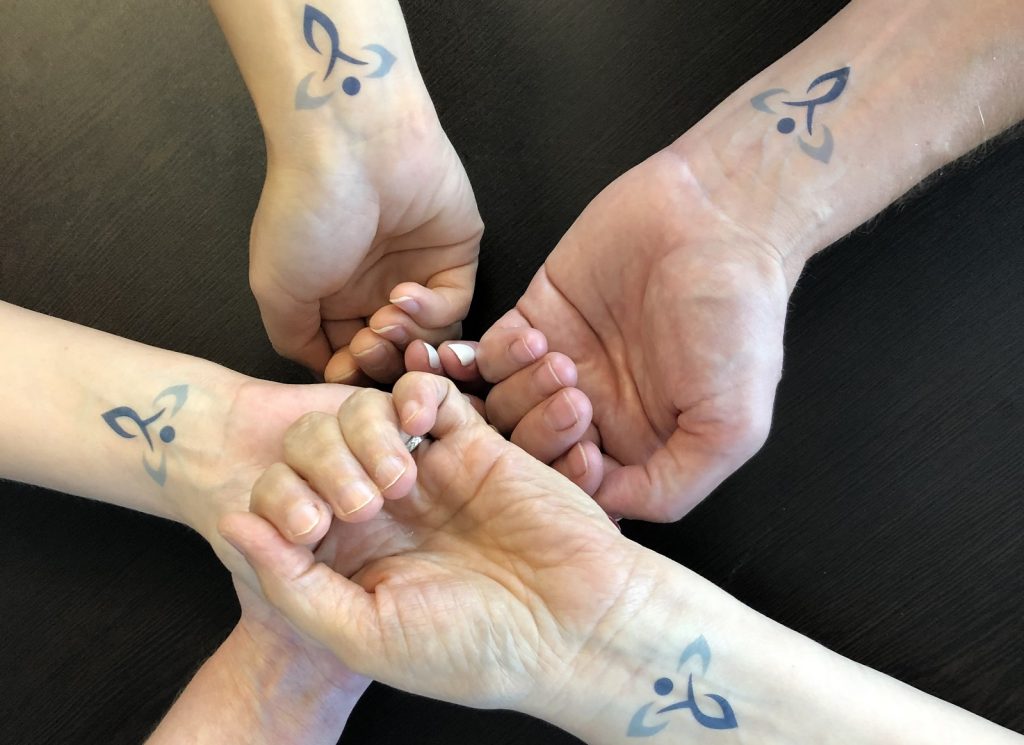You’ve come in for your annual OBGYN appointment. Your gynecologist says during the exam, “I believe you have fibroids.” The statement catches you off guard because 1) you barely know what a fibroid is, and 2) anything you have heard about fibroids is that they cause pain. No need to worry! Fibroids are benign tumors made up of muscular and fibrous tissue in the uterus. They are noncancerous and very common, with 3 out of 4 women developing them in their lifetime. Many women don’t experience any pain. But that doesn’t mean you won’t have a litany of questions to ask your OBGYN about uterine fibroids, fibroid removal, treatment options, and your unique situation.
Whether you don’t know for sure if you have fibroids, you’re finding out in the middle of a gynecologist appointment, or you have a diagnosis and are researching fibroid removal and treatment, it’s helpful to have a prepared list of questions. The odds are that your doctor will answer many of them before you ask, but a list can help you organize your thoughts so that you are as informed as possible.
Below isn’t a complete list of questions. But it is a great place to start the next conversation with your OBGYN.
Uterine Fibroid Treatment and Fibroid Removal: Questions to Ask Your Doctor
Question #1: What are uterine fibroids?
Fibroids are the most common tumor in the female reproductive system. Researchers are not quite sure yet what causes fibroids, but depending on your situation and potential symptoms, you may have one or several. With that said, they could all differ in size and either stay that way or grow at different rates.
Many women don’t experience symptoms, but that doesn’t mean they won’t eventually. Regardless of the fibroid sizes or locations, you may have painful or even just debilitating symptoms that can make completing daily activities extremely difficult. A few of the more common fibroid symptoms are:
- Excessive menstrual bleeding or spotting
- Periods that last longer than a week
- Pelvic pain and pressure (can feel like fullness or bloating)
- Pain during sexual intercourse
- Back or leg pain
- Constipation, bladder control issues, or discomfort in the rectum
Question #2: Are fibroids cancerous?
The most important characteristic of fibroids is that they’re almost always benign or noncancerous. In fact, the Office on Women’s Health says that less than one in 1,000 cases involve a cancerous fibroid. Having fibroids doesn’t increase the risk of developing a cancerous fibroid.
Question #3: Can I prevent fibroids?
Fibroids are very difficult to avoid because of factors beyond our control. With that said, making healthy lifestyle choices, being educated on fibroids and their warning signs, and seeing your doctor regularly could decrease your risk, delay development, and put yourself in a position where your specific fibroid situation never requires invasive treatment.

Question #4: Is fibroid removal or treatment necessary?
Just because you have fibroids doesn’t mean they need to be treated. In many cases where patients have asymptomatic fibroids, and there isn’t cause for any additional complications, their OBGYN might recommend a “wait and see” approach. And this is a completely acceptable answer.
If you start noticing changes in your menstrual cycle that aren’t what you’re used to, or you begin experiencing pain and symptoms like those mentioned above, you may want to consider seeking treatment. Your OBGYN can suggest a variety of options for fibroid removal and treatment, which leads us to Question #5.
Question #5: What are my options for fibroid removal and treatment?
The good news when it comes to uterine fibroid treatment is that women today have plenty of options. It’s not like the old days where doctors immediately suggested a hysterectomy. That’s not to suggest that a hysterectomy isn’t the best option for you. But many alternatives exist, including those that don’t require surgery. A few options are:
- Hysterectomy — Removes all or part of a woman’s uterus and, in some cases, the fallopian tubes and ovaries. In certain circumstances, your doctor will recommend a hysterectomy because it’s the only option to save your life. For example, you could have invasive cancer of the uterus, ovaries, or cervix, or you could have uncontrollable bleeding. It should be noted that according to a study published in the American Journal of Obstetrics & Gynecology, as many as 1 in 5 women in the United States whose doctor recommends a hysterectomy don’t need one.
- Myomectomy — This surgical procedure is similar to a hysterectomy, but the goal is to preserve the uterus so that a woman can still have children in the future. Approximately 30,000 myomectomy surgeries are performed annually, and many patients say they no longer experience fibroid pain and symptoms after this fibroid treatment procedure.
- Uterine Fibroid Embolization — UFE is a unique, minimally invasive treatment. Rather than remove fibroids, UFE blocks the blood flow to fibroids, causing the fibroids to shrink and die. This procedure is performed by an interventional radiologist who injects small particles through a tiny catheter into the blood vessels that feed fibroids. With UFE, there’s no vaginal access, no incision, and a dramatic reduction in symptoms for many women. In addition, the recovery time is much faster than traditional surgery.
Rather than a hospital stay, UFE is a same-day outpatient procedure. In fact, at Fibroid Institute, we offer UFE to patients in the comfort of our offices equipped with advanced medical technology. Dr. Suzanne Slonim and Dr. John Fischer perform UFE utilizing the radial artery, which requires a small wrist puncture rather than an abdominal incision.

Question #6: Do you have a relationship with an interventional radiologist?
Your OBGYN knows your history and should provide you with treatment options. If UFE is an option, your doctor can refer you to an interventional radiologist. Fibroid Institute Texas is the go-to fibroid expert when it comes to experienced physicians treating fibroids using UFE with a high success rate and satisfied patients. We love developing relationships with gynecologists and other referring practitioners in the North Texas and South Texas areas. Even if you don’t get referred by a doctor, you can still make an appointment directly with Fibroid Institute for consultation and learn if you are a good candidate for UFE.
Question #7: If I do nothing, will fibroids keep me from getting pregnant?
Every situation is different. But what we can tell you is that while many women develop fibroids in their lifetime, only 20% have symptoms. Therefore, pregnancy complications resulting from fibroids are generally not an issue. According to the American Society for Reproductive Medicine, fibroids are only found in 2% to 12% of pregnant women. Furthermore, most fibroids do not become too large or cause problems. If a fibroid grows, it usually does so in the first 12 weeks of pregnancy. If you do decide to do treatment, it’s important to note that some treatments like UFE can allow a woman to get pregnant in the future.
Consider All Your Options for Fibroid Treatment
We understand it can be overwhelming when first diagnosed with fibroids, as well as deciding what is the right choice for you regarding fibroid treatment. Untangling the web of confusion and giving you confidence to move forward takes a consultative approach with your doctor to determine the best path for you. Dr. John Fischer and Dr. Suzanne Slonim are unique Texas fibroid specialists, bringing together an expert team, you and your doctor in guiding you toward the best approach.
Fibroid Institute Texas is your go-to source for educating patients about uterine fibroids and minimally invasive procedures such as Uterine Fibroid Embolization (UFE). At Fibroid Institute, we are dedicated to helping you become #FibroidFree. Thousands of women have had their fibroids symptoms treated with UFE at our state-of-the art treatment facility. Simply read our 5-star patient reviews.
Most major medical insurance providers cover the cost of UFE. You will need a formal consultation to determine if you are a candidate before scheduling your procedure. Call for a telehealth consult or an in-office appointment at our Dallas fibroid clinics at 214-838-6440 or Houston fibroid clinics at 713-903-3733 or complete the form below.
"*" indicates required fields
Fibroid Institute Texas serves the Dallas and Houston areas including Fort Worth, Grand Prairie, HEB, Arlington, Hutchins, Irving, Duncanville, DeSoto, Cedar Hill, Lancaster, Cockrell Hill, Highland Park, University Park, Park Cities, Garland, Mesquite, Richardson, Dallas, Sherman, Houston, Sugar Land, Katy, Webster, Clear Lake, The Woodlands, Universal City, Spring, Kingwood, Stafford, Conroe, Texas City, Cypress, League City, Bellaire, Addison, Carrollton, Plano, Frisco, McKinney, Allen, and more.
Prior to starting any new treatment or if you have questions regarding a medical condition, always seek the advice of your doctor or other qualified health provider. This information is not a substitute for professional medical advice.

